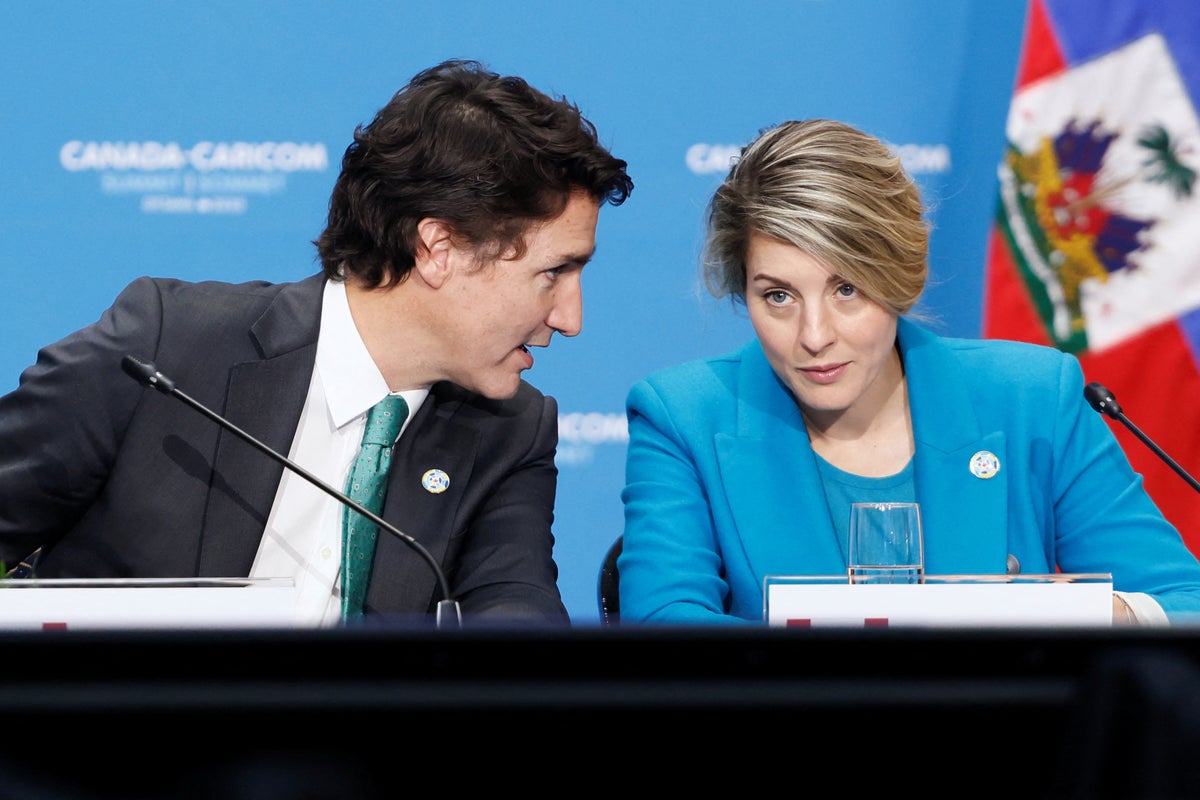
Canada has recalled 41 diplomats from India after Delhi threatened to strip diplomatic immunity of its staff, Ottawa said amid an escalating diplomatic row.
Canadian foreign minister Melanie Joly said India’s demand to withdraw diplomats was “unreasonable” and in violation of international law on diplomatic relations, a criticism rejected by India.
Relations between India and Canada have torpedoed to their worst in their recent history after prime minister Justin Trudeau said there were “credible allegations” of the Indian state’s involvement in the murder of Canadian-Sikh separatist leader Hardeep Singh Nijjar.
India has rejected the allegations, calling them absurd.
It comes after the Indian foreign ministry asked Canada to withdraw 41 of its 62 diplomats in New Delhi by 10 October, citing “parity” in an attempt to downsize the country’s diplomatic presence.
It was widely seen as one of the retaliatory moves as India also suspended visa services in all categories for all Canadian nationals, citing “security threats” to its consulates.
Ms Joly on Thursday confirmed that 41 diplomats in India have been removed, along with their dependents.
A photograph of late temple president Hardeep Singh Nijjar is seen on a banner outside the Guru Nanak Sikh Gurdwara Sahib in Surrey, British Columbia
She added exceptions have been made for 21 Canadian diplomats who will remain in India, criticising India for their request.
Ms Joly said removing diplomatic immunity of diplomats is not only unprecedented but contrary to international law.
“A unilateral revocation of diplomatic privileges and immunities is contrary to international law, including the Vienna Convention on Diplomatic Relations,” she said in the press conference.
“This action taken by India is completely unreasonable and escalatory.”
She said Canada will not reciprocate as continues to defend international law, which applies equally to all states.
“Canada will continue to engage India and remains committed to dialogue as we move forward,” she said.
Trudeau held a meeting with Indian Prime Minister Narendra Modi during the G20 Summit in New Delhi
Indian foreign minister on Friday criticised Ottawa for their allegations and accused Canadian diplomats of “interference in internal affairs” of Delhi.
“We reject any attempt to portray the implementation of parity as a violation of international norms,” a statement by the foreign ministry said.
“The state of our bilateral relations, the much higher number of Canadian diplomats in India, and their continued interference in our internal affairs warrant a parity in mutual diplomatic presence in New Delhi and Ottawa,” it said.
The statement said their request for parity was consistent with Article 11.1 of the Vienna Convention on Diplomatic Relations which says the host country can demand “reasonable and normal” limits to the size of the mission in the absence of prior agreements.
Canada on Friday said it was temporarily halting all in-person operations in consulates in several Indian cities and warned of visa processing delays due to the withdrawal of staff.
An Indian flag is laid on the street as protesters wave a Canadian and Khalistan flags during a protest outside the Indian Consulate in Vancouver
Services will be paused in consulates in Bengaluru, Chandigarh and Mumbai.
The decision is expected to affect Indian citizens, including international students looking to study in Canada, amid a high number of applications from India.
In 2022, the majority of applicants for both temporary and permanent residency in Canada were Indian nationals.
Separately, India is not planning to impose any measures to curb imports or investments from Canada despite the dispute, Indian government sources told Reuters.
The ongoing tensions will not spill into a trade dispute or impact investment, two senior Indian government sources said.
Following Mr Trudeau’s allegation, Canada and India expelled their top diplomats in a tit-for-tat move.
Candian officials said they had privately briefed Indian officials about the investigation and sought assistance before they went public.
Intelligence on the slaying of the Sikh Canadian includes exchanges from Indian officials and diplomats in Canada and some of it was provided by a member of the “Five Eyes” intelligence-sharing alliance, Officials had said.
The alliance includes the United States, Britain, Australia and New Zealand, in addition to Canada.
Meanwhile, the UK, the US and Australia have urged India to assist Canada in investigating the killing.
Nijjar, a Sikh separatist leader, was murdered in Vancouver on 18 June by two masked men, who fired an estimated 30 to 50 shots at him.
He was a leader in what remains of a once-strong movement to create an independent Sikh homeland, known as Khalistan.







